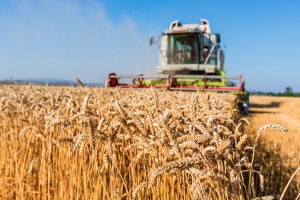


(Posted on 14/04/20)
The Iowa Soybean Association, Quantified Ventures and Cargill are announcing the launch of a collaborative, market-based program to accelerate soil health and water conservation across Iowa farmland and provide a critical new source of financial incentives to Iowa farmers.
The Soil and Water Outcomes Fund compensates farmers for implementing agricultural management best practices on their farms. The resulting environmental improvements, including enhanced water quality and carbon sequestration, are independently monitored, verified and purchased by municipal, corporate, and governmental entities who are seeking innovative ways to reduce their environmental impacts and costs.
“The Fund is a win-win for farmers implementing conservation practices and those benefiting from the outcomes of those practices,” says Adam Kiel, Iowa Soybean Association (ISA) Director of Conservation and External Programs. “Farmers are well positioned to play a lead role in improving water quality and sequestering carbon,” Kiel says. “It’s also an ideal way for farmers to scale beyond the acre and contract limits of traditional government funded cost share programs.”
Nearly 10,000 acres in Iowa are already enrolled in the Soil and Water Outcomes Fund. This year, the Fund will achieve an estimated 100,000 pounds of nitrogen reductions and 10,000 pounds of phosphorus reductions in water. Additionally, 7,500 tons of carbon dioxide will be sequestered in soils, an amount equivalent to removing 1,480 cars from the road. The intent is to scale the Fund into additional states and regions to realize even greater positive environmental impacts and farmer benefits.
The outcomes-based funding model aligns with Cargill’s strategic focus to develop scalable, public-private partnerships that enable farmers to improve soil health, carbon storage and water quality and access.
“Cargill is excited about the potential of this innovative approach to support and mitigate risk for farmers as they invest in soil health and other conservation best management practices,” said Ryan Sirolli, Director of Row Crop Sustainability at Cargill. “We’re incentivizing more participants to implement best management practices that provide positive benefits for their business and the environment.”
For participating municipalities, benefits include flexibility with permit requirements, source water protection, flood risk reduction and cost savings over grey infrastructure.
Corporations and the industry see value in enhanced soil carbon sequestration to meet supply chain sustainability commitments
Farmers see improved on-farm agronomics and resiliency as they build healthier soils.
ADM and Mitsubishi Corporation have signed a non-binding memorandum of understanding to form a strategic... Read more
ESL Shipping and global steel manufacturer SSAB have agreed on a multi-year extension of the agreement... Read more
Anglo American’s Sakatti copper and polymetallic project in Finland has been designated as a &... Read more
FEFAC, representing the EU compound feed and premix manufacturers, noted with deep concern the announced... Read more
Catering to the growing demand from India’s confectionery, infant formula, and dairy sectors,... Read more
Khalifa Economic Zones Abu Dhabi – KEZAD Group, the largest operator of integrated and purpose... Read more
Rio Tinto will invest $1.8 billion1 to develop the Brockman Syncline 1 mine project (BS1), extending... Read more
Catherine Cobden, President and CEO of the Canadian Steel Producers Association (CSPA), has released... Read more
Enough domestic ferrous scrap is available for electric arc furnace (EAF) steelmakers to supply nearly... Read more
Cargill’s Ocean Transportation business and leading tanker shipping company, Hafnia, have joined... Read more